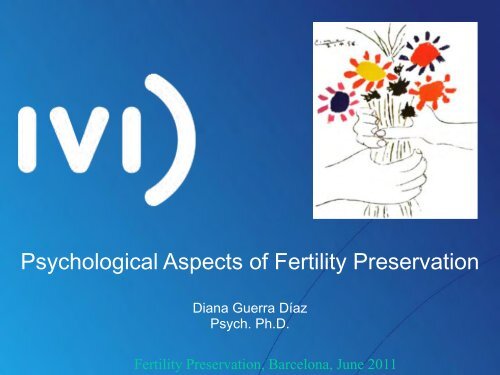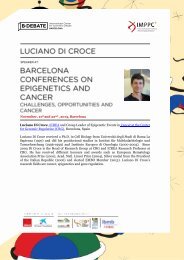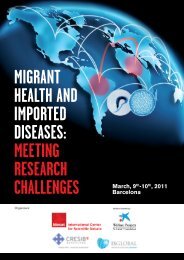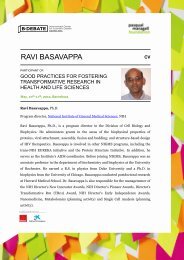Psychological Aspects of Fertility Preservation - B·Debate
Psychological Aspects of Fertility Preservation - B·Debate
Psychological Aspects of Fertility Preservation - B·Debate
- No tags were found...
Create successful ePaper yourself
Turn your PDF publications into a flip-book with our unique Google optimized e-Paper software.
What do we know?InfertilityThe existing literature showsthat fertility is an importantissue for cancer patients andthat there is considerableconcern regarding the fertilityimpairment due to cancer andits treatment ?<strong>Fertility</strong> <strong>Preservation</strong>, Barcelona, June 2011
Infertility ConcernsSurvivors <strong>of</strong>ten have exaggerated concerns abouttheir children's health risks, but still prefer to havebiological children if possible 1More research is needed on whether participatingin fertility preservation reduces long-term distressabout cancer-related fertility. Better evidencebasedprograms to educate families and reducedecisional conflict are needed1.Schover, 2009
What do we know?<strong>Fertility</strong> <strong>Preservation</strong>, Barcelona, June 2011
The psychology <strong>of</strong> cancer experience <strong>of</strong> the child/youthand the parentsDestructionFear, Anxiety, PanicEmotionalCopingDisfigurementDisabilityAnger, Rumination,JealousyCognitiveCopingDeathDependenceSadness, Depression,DesperationBehavirouralCoping
Bodurka-Bevers, D et al., 2000; Trask, P.C et al., 2002; Ganz, P.A. et al., 2002; Brown,K.W. et al., 2003<strong>Fertility</strong> <strong>Preservation</strong>- the possible “counterpart”• Life threatening• Fear <strong>of</strong> death• Loss <strong>of</strong> the child• Loss <strong>of</strong> life perspective• Damage to the family concept• Hopelessness• Preserve autonomy• <strong>Preservation</strong> <strong>of</strong> life• Hope for life• Value, Sense in life• Joy and Pride• Optimism, Strength
The possible “counterpart”<strong>Fertility</strong> !<strong>Fertility</strong> <strong>Preservation</strong>, Barcelona, June 2011
What do we know?• Recently, Tschudin and Bitzer reviewedthe literature from 1998 to 2008• They identified only 24 studies that mettheir inclusion criteria on the psychologicalaspects <strong>of</strong> fertility preservationTschudin, S. and Bitzer,J.( 2009),Hum Reprod.15, 5: 587–597
Knowledge about, attitude towards and use <strong>of</strong>fertility preservation by patients and pr<strong>of</strong>essionals• Cancer did not influence the desire for pregnancy in71% <strong>of</strong> women and 68% <strong>of</strong> men 1• 29% <strong>of</strong> breast cancer survivors claimed that concernsabout future fertility had an impact on their decisionwith regard to therapy 2• Parents from pubertal boys would have given consentin 60% . There were no significant differences whencomparing responses from mothers with responsesfrom fathers 31.Schover, 2002; Zanagnolo, 2005. 2.Patridge, 2004. 3. Van den Berg et al, 2007
Knowledge about, attitude towards and use <strong>of</strong>fertility preservation by patients and pr<strong>of</strong>essionals• The majority <strong>of</strong> breast cancer (86%) reported knowing atdiagnosis that adjuvant chemotherapy might affect fertility 1• Women who were diagnosed more recently were morelikely to know about the impact <strong>of</strong> treatment on fertility thanwomen diagnosed several years ago 1• Existing literature suggests that most cancer survivorsemphasized the need for health pr<strong>of</strong>essionals to be clearand directive in addressing the risk for infertility associatedwith cancer treatment regimes 21. Partridge et al, 2004. 2. Schover et al, 2002. Rosen et al, 2011
Knowledge about, attitude towards and use <strong>of</strong>fertility preservation by patients and pr<strong>of</strong>essionals• Health pr<strong>of</strong>essionals as well as patients and their parentsconsider fertility preservation an important option for youngcancer patients, although for the patients themselves, theperceived relevance seems to depend on factors such asthe stage <strong>of</strong> life at cancer diagnosis 1• All parties involved are shown to have knowledge andinformation deficits. Counseling regarding fertility issues isfar from being <strong>of</strong>fered globally to all patients at risk, and theprovision <strong>of</strong> information by health pr<strong>of</strong>essionals as well aspatient and parental recall <strong>of</strong> having been informed seemsto be selective 2• 1. Goodwin et al, 2007. 2 Quinn et al, 2007
<strong>Fertility</strong> <strong>Preservation</strong> CounselingIt depends on…The percentage <strong>of</strong> patientsrecalling counseling aboutthe impact <strong>of</strong> cancer onfertility ranges from 34% to72%Schover et al, 1999. Duffy et al, 2005
Most common health pr<strong>of</strong>essionals to discusscancer-related infertilityWho?• Treating physicians 55%• Nurses 21%• Family physicians 8%• Sperm banking: oncologyphysicians 40%<strong>Fertility</strong> <strong>Preservation</strong>, Barcelona, June 2011
Information about <strong>Fertility</strong> <strong>Preservation</strong>• Lack <strong>of</strong> knowledge amongphysicians?Why?• Oncologist‟s Attitudes?• Specific challenges in dealingwith cancer and fertility at thesame time?• Short time period betweendiagnosis and treatmentstarts?
Mental Health ProvidersWhat canwe do?• Facing Complex decisionswhen considering <strong>Fertility</strong><strong>Preservation</strong>• mood changes• sexual difficulties• self-esteem problems• other life stressors
Models <strong>of</strong> CounselingImplications Counseling• Assess the present emotional,cognitive and physical state <strong>of</strong> thepatientAssess!• Assess the partner/family support• Assess the patient´s wish for a child• Assess the patient´s perception andinterpretation <strong>of</strong> the “frozen embryo”• Anticipate different possiblescenarios and discuss copingstrategies
Predictors <strong>of</strong> Psychosocial DistressTake care!• Women with past histories <strong>of</strong>trauma, previouspsychological distress• Women experiencingadditional stressful events• Younger women with childrenat homeGreen at al,2005
Models <strong>of</strong> CounselingShared Decision Making• Inform and educate patients abouttherapeutic optionsCounsel!• Describe in simple words and withabsolute numbers• Support patients in attributing theirpersonal value to these numbers• When emotional needs <strong>of</strong> patients areaddressed, normalized and consideredstandard care, patients may feelunderstood and most fully cared for
Coping styles in malignant diseases• Internal or personal locus -<strong>of</strong>controlPersonalitytraits• Being optimistic• Taking a minimizingperspective• Problem solving• Seeking social support• Actively processing• Expressing emotions
To ConcludeCounseling is necessary for all patients confronted withcancer/malignant diseases during their reproductive lifeThis is primarily intended to provide clear and preciseinformation on ART and discuss all existing options,including cryopreservation <strong>of</strong> oocytes, PNs or ovariantissue or refusal <strong>of</strong> fertility preserving methods
To ConcludeThe team can provide better care by understandingemotional needs, psychosocial predictors <strong>of</strong> distress andmethods <strong>of</strong> copingCounseling <strong>of</strong>fers support for young people or couplesconfronted with stressful cancer/malignant diseases andfertility issues and helps them through their sometimesdifficult decision-making process
The Future?!!!!!Guidelinesand TeamimplicationClose collaborationbetween the differenttherapeutic teams involved(onco-gynaecologists,oncologists, radiotherapyspecialists, ART specialistsand counselors) is <strong>of</strong> theutmost importance<strong>Fertility</strong> <strong>Preservation</strong>, Barcelona, June 2011
diana.guerra@ivi.esRda Gral Mitre, 14Barcelonawww.ivi.es<strong>Fertility</strong> <strong>Preservation</strong>, Barcelona, June 2011PÁG.21











